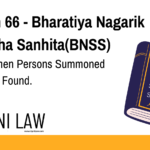BNSS Section 64: Summons How Served
Code:
(1) Every summons shall be served by a police officer, or subject to such rules as the State Government may make in this behalf, by an officer of the Court issuing it or other
public servant:
Provided that the police station or the registrar in the Court shall maintain a register to enter the address, email address, phone number and such other details as the State Government may, by rules, provide.
(2) The summons shall, if practicable, be served personally on the person summoned, by delivering or tendering to him one of the duplicates of the summons:
Provided that summons bearing the image of Court’s seal may also be served by electronic communication in such form and in such manner, as the State Government may, by rules, provide.
(3) Every person on whom a summons is so served personally shall, if so required by the serving officer, sign a receipt therefor on the back of the other duplicate.
Explanation:
This section outlines the procedures for serving summonses in legal proceedings. A summons is a formal document that requires an individual to appear before a court.
Sub-section (1):
- Summonses are typically served by a police officer.
- State Governments can establish rules permitting other individuals to serve summonses, such as court officers or other public servants.
- The police station or court registrar must maintain a register recording the address, email address, and phone number of the person being summoned, along with any other details specified by the State Government.
Sub-section (2) :
- Summonses should be served personally whenever possible by physically delivering or offering a copy to the recipient.
- State Governments can implement rules permitting electronic service of summonses, provided the electronic communication bears the court seal’s image. This method of service must adhere to the rules set forth by the State Government.
- (3): When a person receives a summons personally, they must sign a receipt on the back of the remaining copy of the summons if requested by the serving officer.
Illustration: Summons How Served
Imagine a person is summoned to appear in court for a traffic violation. The police officer would serve the summons personally by delivering a copy to the recipient. The officer would then request the recipient to sign a receipt on the back of the remaining copy of the summons.
Common Questions and Answers: Summons How Served
Q: Who can serve a summons?
A: Primarily, police officers serve summonses. State Governments can authorize other individuals like court officers or public servants to do so.
Q: What is the purpose of the register maintained by the police station or court registrar?
A: This register records the contact information of the person being summoned, ensuring proper communication and tracking of summons service.
Q: Can a summons be served electronically?
A: Yes, but only if the State Government has established rules for electronic service. The electronic document bears the court seal.
Q: Is a recipient required to sign a receipt after receiving a summons?
A: If the serving officer requests it, the recipient must sign a receipt on the remaining copy of the summons.









